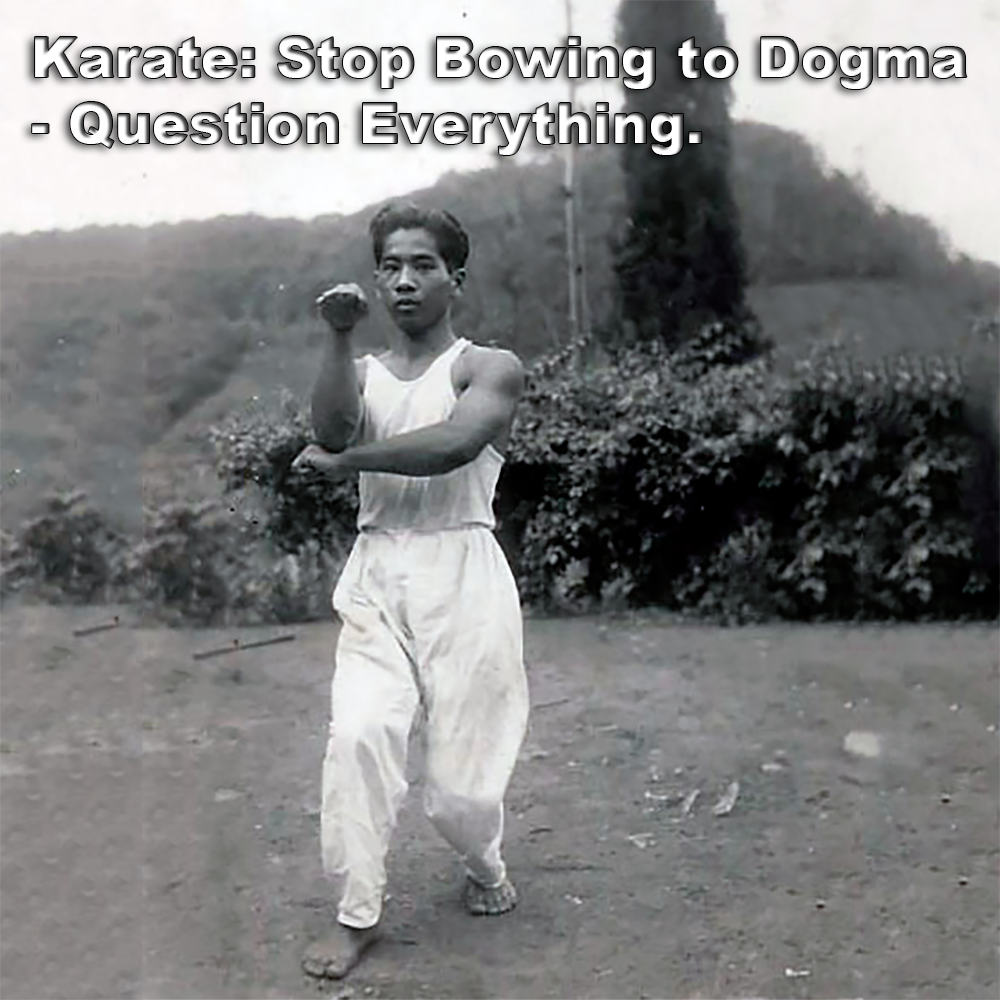
(Approx 2 minute 45 second read)
The majority of karate today is plagued by dogma. Let me explain.
.
After the Second World War, Okinawa was in ruins. Many of the teachers who started up again back then had learned the ‘school karate’ model – all about building strong bodies and disciplined minds. Not every Okinawan dojo went this way, but a lot did.
.
I believe many of those old teachers still knew what karate really was before the war. But times changed. They adapted. They shaped what they taught to fit what society wanted – physical training, discipline, order.
.
Meanwhile, on mainland Japan, karate spread fast thanks to people like Funakoshi. But it didn’t spread unchanged. It was moulded to fit the systems already in place – Kendo, Judo – with uniforms, ranks, competitions, and all the rest of it.
.
By the time karate reached the rest of the world, what we got was already watered down. Big names became legends. Their skills looked untouchable. People took every word as gospel.
.
But what was karate now?
.
It was still advertised as self-defense. The demos looked sharp, powerful, dealing with multiple attackers from multiple directions. But many students and instructors clung to this image like it was holy scripture. They defended the strangest theories and drills with a straight face.
.
Japanese masters travelled the world and picked up loyal students who never questioned. I know. I was one of them.
.
These days, more and more of us are digging through what was left behind – trying to see it with clear eyes. Trying to pull out what works in the real world, not just what looks good lined up in a sports hall.
.
But there’s still blind devotion. Some students and instructors just repeat what they are told – no questions asked. Memorize, regurgitate, don’t deviate. That’s not karate, not for me.
.
You have to get to the heart of it. Be honest enough to see when something doesn’t hold up. Question it.
.
A Godan from a different style had a dig at me recently. He said, “For those of us that don’t understand, why don’t you enlighten us more?” He was being sarcastic. Patronizing.
.
He brought up his Japanese sensei, too – as if there’s no way his teacher could have missed anything. He thought my ideas must be made up. They made sense to him he said (?), but he was sure that if his own sensei had known them, he would’ve taught them to him.
.
That’s the problem right there. This belief that your teacher knows everything worth knowing. So if you find something they didn’t show you – you must be wrong. It can’t be that they overlooked it, or chose not to teach it, or didn’t think you were ready. That’s how people get stuck. They shut the door on new ideas – even when they’re not new at all. They’re just buried under ‘the way it’s done.’
.
Karate isn’t a museum piece. It’s not meant to be frozen in time and never questioned. It’s meant to be used, tested, adjusted, questioned again. If your teacher’s any good, they’ll want you to do exactly that – not just copy, bow, and keep your mouth shut.
.
Too many dojos don’t ask the simplest question – does this really keep you safe? And I’m not just talking about fighting. Real self-defense starts long before a punch is thrown. It’s about seeing trouble coming, avoiding it, walking away if you can.
.
Context is everything.
.
The last thing I want is a fight. If I can leave without a bruise or a broken nose, good. I’d rather that than explain how I “won” a fight.
.
Funny, though – people still talk tough about fighting first. And if you question it, apparently you’re supposed to “enlighten” everyone. Maybe just think for yourself first.
.
In the end, it’s not about repeating what you were told – it’s about understanding what you’re doing. Context matters. Train with purpose. Question with honesty. That’s enough.
.
.
Written by Adam Carter – Shuri Dojo
.
.
Photo Credit: Toguchi Reiji performing Gojūshiho courtesy of Budo Japan
